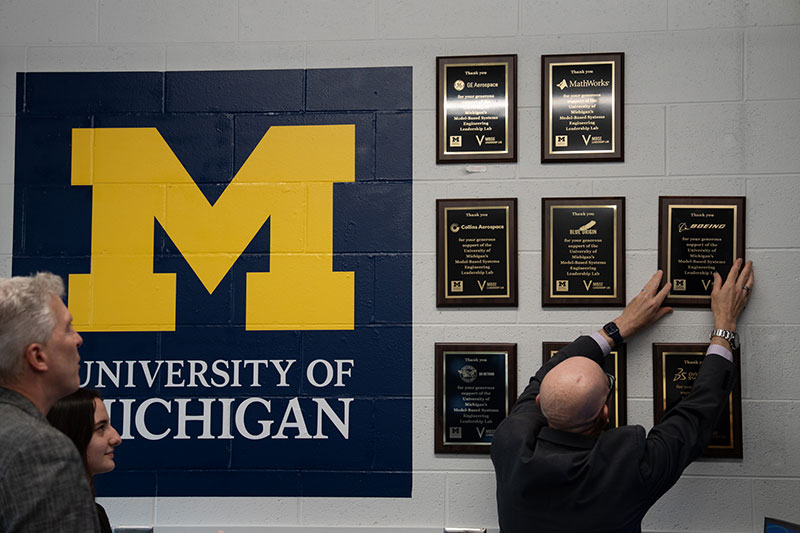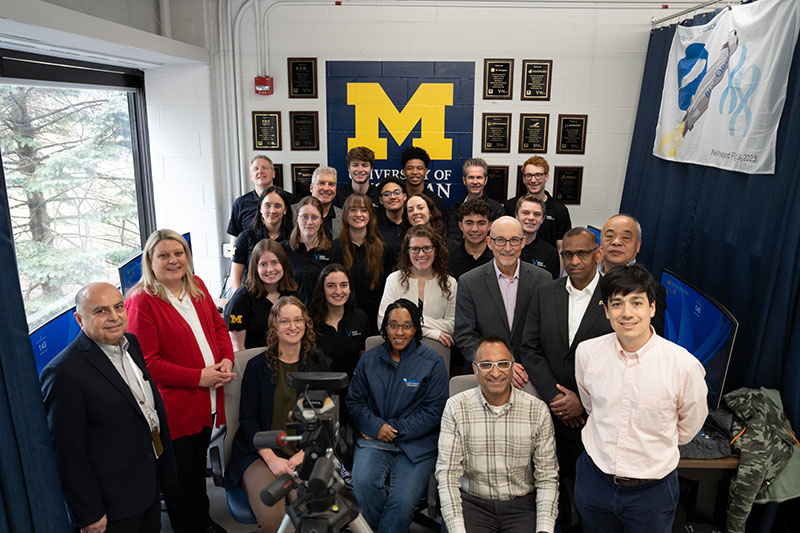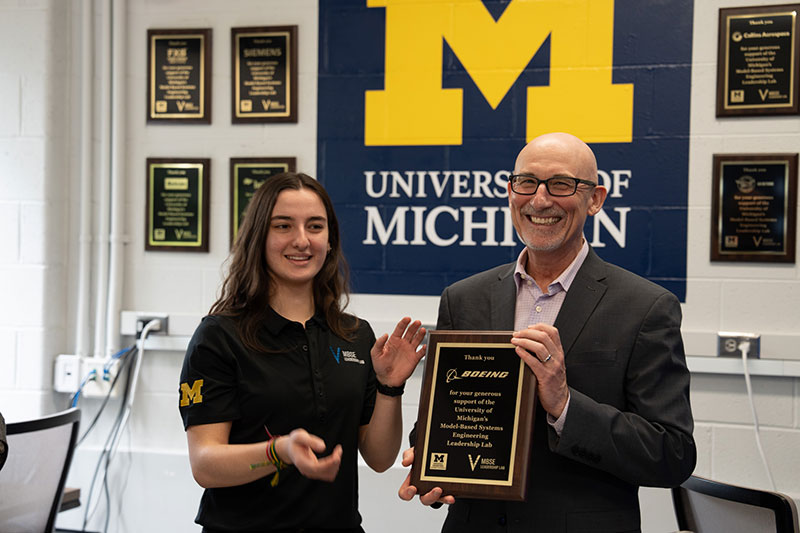
Boeing Joins the MBSE Ecosystem
The MBSE and x88 course series expands yet again with heavy hitting industry partners

The MBSE and x88 course series expands yet again with heavy hitting industry partners
Boeing recently joined the Model Based Systems Engineering (MBSE) Lab and systems engineering leadership education x88 course series, alongside the lab’s long list of outstanding industry leaders who have partnered with this first-of-its-kind undergraduate experience. The Boeing partnership was commemorated with leaders from the company being welcomed to the department for the honorary plaque hanging ceremony, where they were also able to network with students and tour the lab facility.

After the ceremony, Jane Matera, Vice President of Boeing Commercial Airplanes Commercial Derivatives Engineering at Boeing and U-M graduate (BSME, ’92), commented, “Boeing is pleased to partner with U-M in the MBSE/x88 lab. Our commitment to developing the next generation of engineering leaders aligns with the focus of this course, as the students partner to solve real-world complex problems using systems engineering.”
MBSE is the formalized application of modeling to support system requirements, design, analysis, verification and validation activities beginning in the conceptual design phase and continuing throughout development and later life cycle phases. A major goal of MBSE and the x88 course series is to provide support and knowledge to students in their undergraduate career about various tools that can be used for modeling and project management. The MBSE Lab and associated x88 curriculum was conceived and is led by Aerospace Engineering Professor George Halow, and is being taught by Professor Halow and Aerospace Engineering Professor Jonathan Van Noord.
Claudia Zimmerman, a recent U-M graduate who was a Graduate Student Instructor for the x88 course series and now works as a Boeing Engineer stated, “As a 777X systems engineer at Boeing, I use my x88 course experience, it provides me with the knowledge and skills needed to effectively support integration between complex systems. The x88 course curriculum exposed me to the importance of robust requirements, traceability, and systems thinking, which, in my current role, I utilize every day to support the development of an integrated, model-based functional architecture.”
The MBSE Lab and x88 course series has become one of the most popular undergraduate courses within the U-M Department of Aerospace Engineering, being among the few offering any programming like this at the undergraduate level, and students from the lab are highly sought after upon graduation and when pursuing internships. Within the professional industry, MBSE has become a best practice with many companies adopting it into their product development and design cycles.

During the partnership ceremony, undergraduate student Rafaela Galera Rogano, the U-M MBSE Lab Manager for the winter 2025 semester and Chief Design Engineer stated, “Professor [George] Halow helped pull me out of my comfort zone when I first became involved with the MBSE lab, and it made a big difference for me. I think we’re helping to do the same for Boeing through this partnership.”
The Boeing Company is a leading global aerospace corporation, specializing in a vast variety of products and designs, from airplanes to rotorcraft to rockets to satellites. The company develops, manufactures and services customers in more than 150 countries, driving innovation, economic opportunity, and community impact.
Dr. Bill Lyons, Executive Director of Boeing Enterprise Technology Office (ETO), said “We are excited to become a partner in the MBSE Lab which extends our long-term collaboration with the University of Michigan. Model-based engineering methods allow us to undertake complex analysis and trade studies of future airplanes very early in the concept design phase. We can see the impacts of design changes across the entire life cycle of our products and services, and uncover issues long before we enter flight test. These tools are rapidly becoming the enablers for a grand second century of powered flight.”
Undergraduate student Lucie Kovarik, the Chief Systems Engineer for the Michigan – Sustainable Aviation with General Electric (M-SAGE) High-Aspect Ratio Plane (HARP) x88 team, explained that the new Boeing partnership aims to develop a Cryogenic Fuel Tank Integration and Airplane Sizing project. The collaboration will span three years, beginning with airplane sizing for performance requirements in the first year. In the second year, the focus will shift to control surface sizing to ensure stability and control. Finally, in the third year, the team will work on developing and integrating a cryogenic fuel delivery system.
“This new addition to our partnership affords us the opportunity, through experiential learning, to help the engineers of the future build the essential skills that surround model-based system engineering. The lab and x88 classes will work on real-world challenges for Boeing, where students not only hone their knowledge, but refine skills such as reflective listening, empathy and managing through different perspectives. One of the first exciting projects is to examine new airplane concepts based around different forms of sustainable fuels and propulsion,” stated Lyons.
Throughout this partnership, the project will emphasize model-based safety assessments, such as Functional Hazard Assessments (FHAs) and System Safety Assessments (SSAs), with the goal of demonstrating how MBSE can support regulatory compliance showing, development assurance, and certification efforts.
“I’m really excited about the opportunity to explore model-based systems engineering through a new lens and teach the incoming students about MBSE in such a unique and hands-on way. It also means a lot to me to be part of another project focused on sustainable aviation as that’s an area I’m deeply passionate about,” stated Kovarik.
Next year, Kovarik will be joining the x88 instructional team as an Instructional Assistant for the AEROSP 388 course. As a lab instructor, she will be facilitating students through Cameo, Siemens NX, Arduino, Simulink, Circuits, CFD, FEA, data analysis, and more, while also leading the Boeing Cryogenic Team as a 488 lead.
Working alongside Kovarik will be undergraduate students, Rafaela Galera Rogano and Sabrina Hansen, Controls Engineer and Testing Lead for the Michigan-Pratt & Whitney Electrification pRoject (M-PWER) x88 team. Next year, Hansen will step into the role of Chief Financial Officer of the x88 ecosystem and will also be a 488 lead on the Boeing Cryogenic Team as Chief Engineer.
“We’ve got a great team here at U-M ready to work with a great team at Boeing,” said Halow. “It took a lot of work on both sides for all of this to come together, and today’s celebration shows it was truly worth the effort. We are so excited for all that lies ahead in this partnership.”
“I’m very excited to integrate model-based systems engineering into a technical space to streamline processes and safety. Being from Seattle, Boeing means a lot to me, and to partner with them is a dream come true,” commented Hansen.